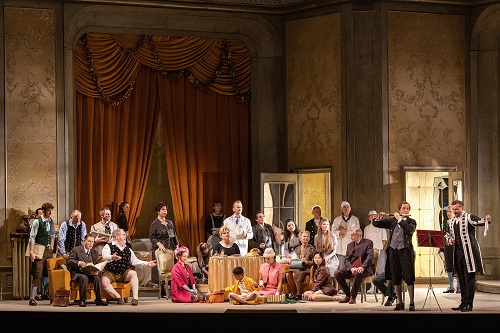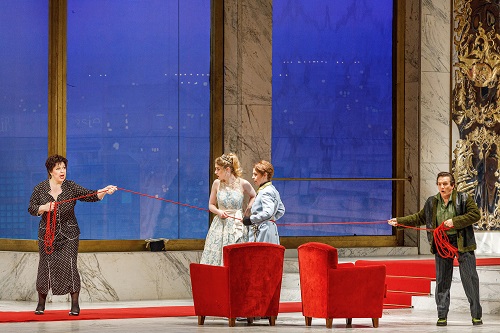 Germany Strauss, Der Rosenkavalier: Soloists, Children’s Choir of the Semperoper Dresden, Dresden State Opera Chorus (chorus director: André Kellinghaus), Sächsische Staatskapelle Dresden / Cornelius Meister (conductor). Semperoper, Dresden, 3.4.2023. (MB)
Germany Strauss, Der Rosenkavalier: Soloists, Children’s Choir of the Semperoper Dresden, Dresden State Opera Chorus (chorus director: André Kellinghaus), Sächsische Staatskapelle Dresden / Cornelius Meister (conductor). Semperoper, Dresden, 3.4.2023. (MB)

One more step back towards operatic ‘normality’, at least in Germany for me: a performance of Der Rosenkavalier with its large cast, no sign of (anti-)social distancing, and as yet no sign of a Covid-themed staging. (We know they are coming: the masks, the ventilators, the Tristan love-duet via Microsoft Teams, the Downing Street ‘Abba parties’; let us enjoy their absence while we can.) My reunion with characters one fancies one knows so well they might be personal acquaintances took place in Dresden, at the Semperoper, in a production by Uwe Eric Laufenberg I saw previously in 2014. It does not seem so long, as the Marschallin would understand all too well.
First seen in 2000, it is, like most of us after the last few years, somewhat looking its age. In 2014, I thought it had belied its years. Whether that says more about me or the production, I do not know: perhaps a bit of both. Updating a century-and-a-half or so does no harm, though it perhaps makes no particular point either other than visualising the distances and anachronisms in which Strauss and Hofmmansthal deal. There are puzzling details, for instance: why does Octavian wear a black tie with evening tails? And there are, I think, a few changes, with some overlap. The peculiar treatment of Mohammed is no more, though he remains unusually evident, only not to appear at all at the close, Ochs’s ‘children’ taking his place. None of that is of particular importance, though, and issues not only of the male gaze – complicated, of course, in a world of cross-dressing – but also of publicity remain strong. The Marschallin’s relation to the latter world is, appropriately, more old-fashioned, her levée remaining much as it ‘should’, whereas chez Faninal, with its touch of Hollywood new money, the Presentation of the Rose is a choreographed photoshoot. Paparazzi or their equivalent even scale the building to gain an ‘exclusive’ picture of Octavian and Sophie ‘in private’. The Italians straddle both worlds.

A notable change this time was the conductor. Christian Thielemann was due to have conducted the performance once more, but withdrew, replaced with Cornelius Meister. If the performance were less razor-sharp than last time, I suspect that was more down to rehearsal time and the vagaries of standing in than anything else. The first act seemed at times to drag, but the second two were well proportioned and full of incident. Moreover, the first-act Prelude can rarely, if ever, have made its intentions, here frankly post-Tannhäuser, more immediately apparent. If you did not feel the earth move, you must not have been listening. Indeed, Meister’s somewhat Wagnerian way with much of the score, gently yet tellingly contradicting lazy assumptions of a volte face after Elektra, brought ready human warmth and motivic integrity in equal measure. The Staatskapelle Dresden, effortlessly at home in this music since its premiere, brought a multitude of colours born of, yet never bogged down in, tradition.
Camilla Nylund’s warmth as the Marschallin, especially in the first act, sounded similarly inspired, or at least in sympathy. She became steelier in the third act, often thrillingly so, in triumphant, only part-tragic, reassertion of her authority. She, after all, may and probably should be understood to direct her own opera — and certainly did so here. Sophie Koch, also Octavian in 2014, seemed a little more out of sorts. In many ways, it was a very good performance, yet it was one that left one thinking this may be a role she, like Octavian with his recent past, should now leave behind, her voice having changed considerably in the meantime. Nikola Hillebrand, an artist new to me, made for a highly impressive Sophie: not only less unsympathetic than often, but more multi-dimensional, on the cusp in so many ways. Peter Rose, another 2014 veteran, gave another highly accomplished performance as Ochs. He knows the role inside out and can play with it, the language in particular assimilated as if he were speaking it spontaneously, yet he takes nothing for granted. His boredom with the Italian singer, here in an utterly outstanding cameo by none other than Pavol Breslik, was as much a joy to watch as last time. Casting was throughout from depth, everyone contributing something. Christa Mayer’s Annina was a class act indeed, having one wish for more. Markus Eiche’s Faninal was similarly, if differently, well observed. Yes, something approaching normality was back, though not without regard to the special quality of the operatic moment.
Mark Berry
Production:
Direction – Uwe Eric Laufenberg
Design – Christoph Schubiger
Costume design – Jessica Karge
Lighting design – Torsten Schäfer, Jan Seeger
Dramaturgy – Hella Bartnig
Cast:
Die Feldmarschallin, Fürstin Werdenberg – Camilla Nylund
Der Baron Ochs auf Lerchenau – Peter Rose
Octavian – Sophie Koch
Herr von Faninal – Markus Eiche
Sophie – Nikola Hillebrand
Jungfer Marianne Leitmetzerin – Daniela Köhler
Valzacchi – Aaron Pegram
Annina – Christa Mayer
Police Officer – Tilmann Rönnebeck
The Marschallin’s Major-domo – Florian Hoffmann
Faninal’s Major-domo – Jürgen Müller
House Servant – Holger Steinert
A Notary – Matthias Henneberg
A Landlord – Kevin Conners
A Singer – Pavol Breslik
A Milliner – Katerina von Benningsen
A Vendor of Pets – Andreas Sauerzapf
Leopold – Yevgen Bondarenko
Lackeys – Jun Seok Bang, Norbert Klasse, Ingolf Stollberg-da Silva, Matthias Beutlich
Waiters – Markus Hansel, Max Hebeis, Andreas Heinze, Thomas Müller
Three noble orphans – Ofeliya Pogosyan, Mariya Taniguchi, Justyna Olów
Lerchenauschen – Alexander Födisch, Wooram Lim, Thomas Müller, Mirko Tuma,
Werner Harke, Holger Steinert
Hairdresser – Mario Kretschmer
Mohammed – Ricardo Garcia Heine